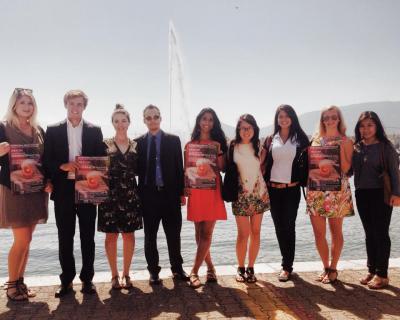Secondary menu
Criminal Justice Reform in Mexico: A Work in Progress
By Katie Bresner, 2L, International Bridges to Justice (Geneva)
 Everyday across the globe, ordinary people are arbitrarily detained and denied access to counsel. Despite the number of countries that have ratified international conventions and passed domestic laws to protect human rights, torture is often still used in certain countries, particularly during the investigation of crimes.
Everyday across the globe, ordinary people are arbitrarily detained and denied access to counsel. Despite the number of countries that have ratified international conventions and passed domestic laws to protect human rights, torture is often still used in certain countries, particularly during the investigation of crimes.
International Bridges to Justice (IBJ) recognizes the gap between the commitment to protect citizen rights, on the one hand, and the implementation and enforcement of the laws that safeguard ordinary people from the violation of their rights, on the other. IBJ works to guarantee the right to competent legal representation, the right to be protected from cruel and unusual punishment, and the right to a fair trial. IBJ’s approach to ending investigative torture recognizes that this human rights violation does not exist in a vacuum; it is the result of systemic problems within the justice system of a country as a whole. By working from the top-down – influencing and collaborating with high-level government and law enforcement officials – and the bottom-up – educating the public and legal professionals – IBJ aims to create lasting and sustainable change in the countries in which they operate.
In large part, IBJ’s strategy is education-based. As an intern for IBJ this summer, I was tasked with contributing to one of IBJ’s educational initiatives: the Criminal Defense Wiki (DefenseWiki). Lawyers in the Global South do not always have the same ease of access to even basic legal resources, such as penal and procedural codes, that we are used to in Canada. The DefenseWiki provides such resources to lawyers in a condensed format and utilizes the knowledge of legal practitioners and professionals, law students, and law professors to continually conduct research and keep the information up-to- date. I was assigned to work on the DefenseWiki page for Mexico.
Mexico’s judicial system has long suffered from problems of institutional corruption. Despite the country’s move from a semi- authoritarian system of control to democracy, the judicial system has been slow to keep pace. A Gallup Poll in 2007 asked whether Mexican citizens had confidence in Mexico’s judicial system; of those who responded, 58% answered “no.” The recent Amnesty International report “Stop Torture Global Survey” asked more specifically whether or not citizens are confident that they would be safe from torture if they were taken into custody by the authorities. Of those surveyed 64% answered “no.”
Many issues plaguing the Mexican criminal justice system stem from procedural delays, a lack of police accountability, limited police resources, and significant restrictions on the accused’s right to an adequate defence. Resource limitations have resulted in significant case backlogs and few cases are fully investigated. Despite the presumption of innocence, criminal accused are sometimes detained for years prior to conviction and sentencing. As David Shirk, a Global Fellow at the Mexico Institute of the Woodrow Wilson International Center for Scholars, notes: “a suspect’s guilty plea is often the sole cause of indictment and conviction.” As a result, torture is frequently used during pre-trial detention to extract confessions.
Mexico acknowledges the problems with its criminal justice system. Under the administration of former President Vicente Fox from 2000 to 2006, constitutional and legislative changes were made to reform the system. Significantly, this included a shift from an inquisitorial model of criminal procedure, drawn from civil law, to an adversarial model, like that of the United States. In 2008, former president Felipe Calderón instituted federal reforms to criminal procedure, including banning the use of investigative torture, increasing due process protections, and requiring that all accused persons have professional legal representation. These federal reforms set an example for state-level criminal codes and procedures, with the goal that the justice system as a whole be restructured by 2016.
By the end of 2012, of Mexico’s 32 states, 22 had ratified the new criminal procedure codes, but only 12 had begun to operationalize them. While the reforms suggested are admirable, they have been criticized as attempting to do too much with too few resources in an unrealistic time frame. Current President Enrique Peña Nieto has reaffirmed his commitment to reforming the criminal justice system, but only time will tell if Mexico is able to reach its goals and end the use of investigative torture.
Photo: IBJ interns in Geneva, Switzerland. From left: Stevanne van der Velden, Joe Rich, Katie Bresner, Guillaume Fournier, Shashi Sahadew, Zoe Lo, Amelia Martinez, Solange Pittet, and Hnin Lwin (credit: International Bridges to Justice)
